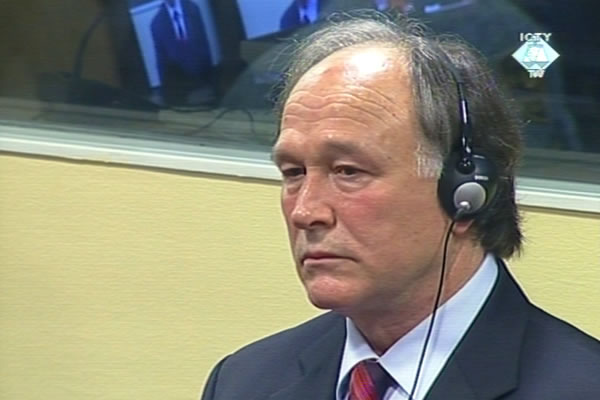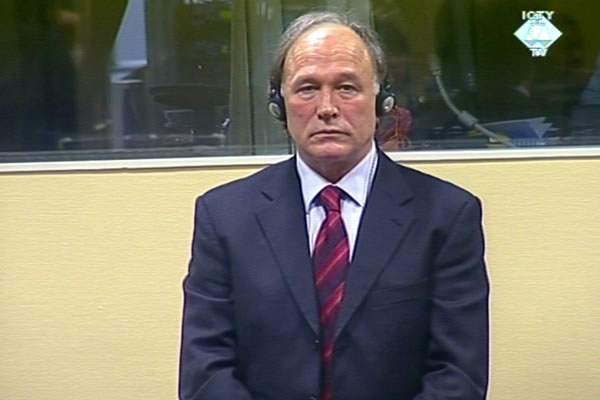Home
GENERAL DJORDJEVIC SENTENCED TO 27 YEARS
Former Serbian deputy interior minister Vlastimir Djordjevic was found guilty of participation in the joint criminal enterprise that resulted in the killing of hundreds of Albanian civilians and the expulsion of thousands of them from Kosovo in 1999. The Trial Chamber found that the accused had full control over the police units that committed the gravest crimes. Djordjevic’s role in the effort to transfer the dead bodies from Kosovo to Serbia was especially highlighted by the Trial Chamber
 Vlastimir Djordjevic in the courtroom
Vlastimir Djordjevic in the courtroom The Trial Chamber with Australian judge Kevin Parker presiding sentenced former Serbian deputy interior minister and chief of the Public Security Department Vlastimir Djordjevic to 27 years in prison today. Djordjevic was found guilty of all five counts in the indictment charging him with crimes against Albanian civilians in Kosovo in 1999. Four counts refer to the deportation, forcible transfer of population, murder and persecution qualified as crimes against humanity and the last count, murder, was qualified as a violation of the laws and customs of war.
Based on the evidence of more than 140 witnesses and thousands of other exhibits, the Trial Chamber concluded that General Djordjevic was one of the key participants in the joint criminal enterprise aimed at changing the ethnic composition of Kosovo and establishing the Serbian control in the province, Judge Parker said. Other prominent participants in the joint criminal enterprise apart from Djordjevic were Serbian politicians Slobodan Milosevic and Nikola Sainovic and police officials Vlajko Stojiljkovic, Radomir Markovic and Sreten Lukic.
A carefully worded summary of the judgment which runs to more than 1,000 pages states that the Trial Chamber was convinced that the crimes in Kosovo happened according to a ‘consistent pattern’. The joint military and police units would surround Albanian villages at dawn. After the village was shelled, the troops would enter the village, setting the buildings on fire and looting the villagers’ property. Women and children were often separated and forced to move towards the Albanian border. Men were divided into smaller groups and killed.
It was those events, the judges found, that caused thousands of Albanian civilians to flee Kosovo, contrary to what the defense claimed – that they fled in fear of NATO attacks and of clashes between the army and police and the KLA. If this explanation for the civilians’ flight were to be accepted, it would remain unclear why the army and the police took away and destroyed the civilians’ personal documents when they left Kosovo.
The defense’s argumentsthat the army and the police in Kosovo were engaged in strictly lawful operations against ‘Albanian terrorists’ and not against civilians and that the accused general did not have any control over the police units in Kosovo were rejected. The Trial Chamber found that Djordjevic had full control over the entire regular and reserve contingent of the MUP in Kosovo, including the Special Police Units (PJPs) and the Special Anti-Terrorist Unit (SAJ). The personnel of those units killed a number of civilians and were responsible for the massacres of women and children in Suva Reka and Podujevo and the incident in which 114 men and boys were executed and set on fire in Mala Krusa near Orahovac.
The Trial Chamber was convinced that at least 724 persons were killed in Kosovo, and at least 200,000 were expelled. The judgment states that the numbers pertain only to 13 municipalities listed in the indictment. These are ‘very conservative estimates’ and the number of people who were expelled and killed is most likely far higher, the judges concluded.
According to the judgment, Djordjevic contributed to the joint criminal enterprise especially by his participation in the coordinated effort to transfer the bodies from Kosovo to several locations in Serbia in order to eliminate the evidence of crimes. The Trial Chamber accepted the evidence called at trial, saying that 744 bodies were exhumed in Batajnica, 61 in Petrovo Selo, and the remains of 84 persons killed in Kosovo were recovered from the Perucac Lake after the conflict ended.
The key role General Djordjevic played in the effort to transfer the bodies may have resulted in the sentence that is five years longer than the sentences imposed on the other members of the same criminal enterprise - Nikola Sainovic, Nebojsa Pavkovic and Sreten Lukic who were tried in another Kosovo trial before the Tribunal for practically the same set of crimes. Military generals Dragoljub Ojdanic and Vladimir Lazarevic were sentenced to 15 years in prison in the same judgment in February 2009. Former Serbian vice-president Milan Milutinovic was acquitted of all charges.
After the judgment was delivered, General Djordjevic quickly left the courtroom without greeting his defense lawyers Dragoljub Djordjevic and Veljko Djurdjic.
Photos
Linked Reports
- Case : Djordjevic - "Kosovo"
- 2010-07-14 DEFENSE: ACQUIT GENERAL DJORDJEVIC
- 2010-07-13 PROSECUTOR: VLASTIMIR DJORDJEVIC’S GUILT HAS BEEN PROVEN
- 2010-05-20 GENERAL DJORDJEVIC’S DEFENSE RESTS
- 2011-05-24 PROSECUTOR: ’27 YEARS IN PRISON INADEQUATE SENTENCE FOR DJORDJEVIC’
- 2011-05-25 DJORDJEVIC ASKS FOR ACQUITTAL OR A MILDER SENTENCE
- 2012-05-11 DJORDJEVIC’S APPEAL TO BE HEARD IN LATE 2012 OR EARLY 2013

